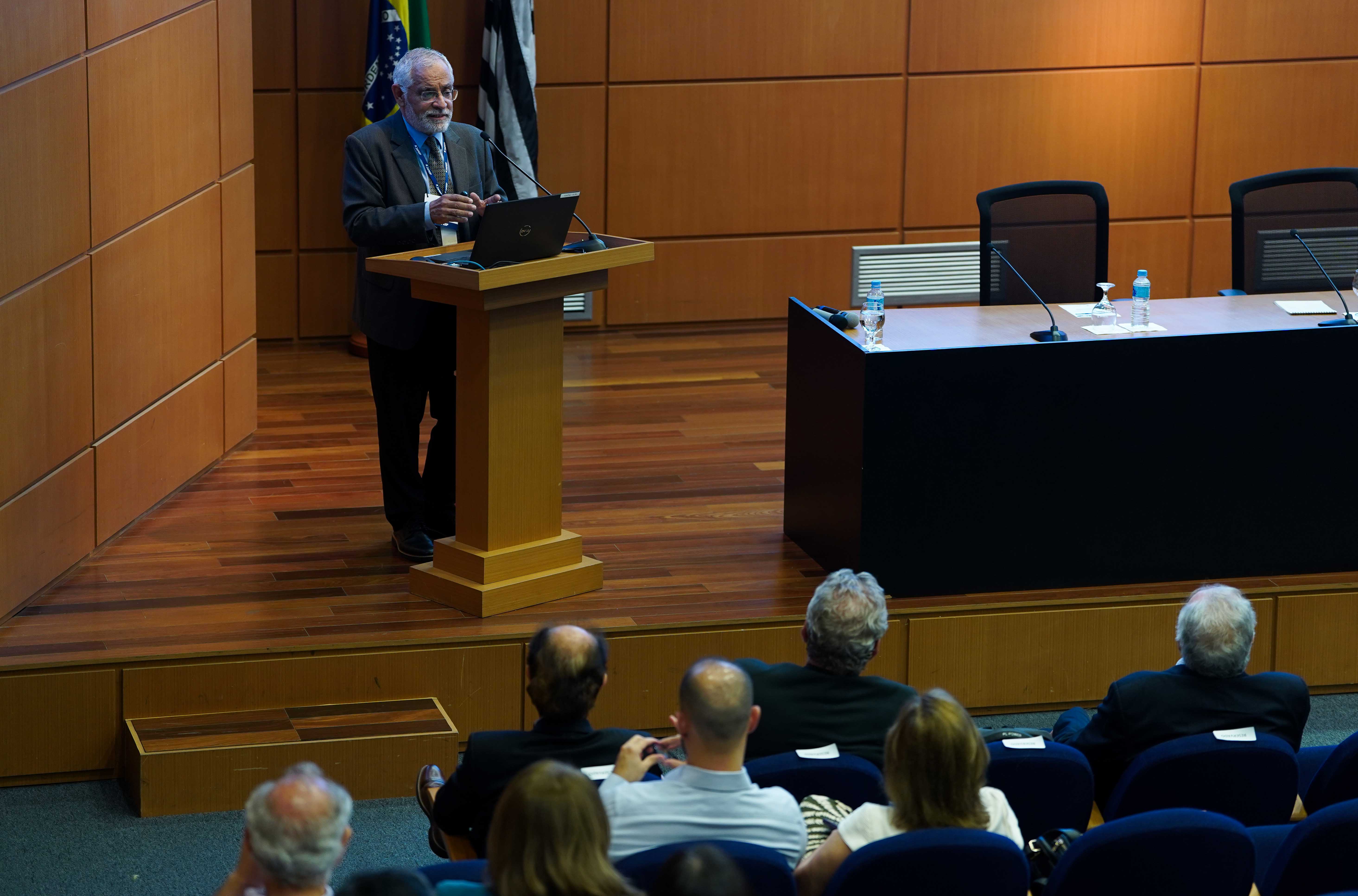


The event took place on November 29 in FAPESP’s auditorium (photo: Daniel Antônio/Agência FAPESP)
Published on 12/16/2024
By José Tadeu Arantes | Agência FAPESP – The energy transition has not happened yet in the transportation sector. Renewable energy consumption by road vehicles changed very little as a percentage of the total amount of fuel burned in the period 2011-21, inching up from 2.6% to only 3.9% globally. Given the urgent and bold solutions required by the climate crisis, this increase can be considered insignificant, if not disgraceful. “Transportation remains atavistically dependent on petroleum,” said Luiz Augusto Horta Nogueira, a mechanical engineer and energy economics specialist, in the 10th FAPESP Lecture 2024, entitled “The future of fuels for mobility in Brazil”.
Horta Nogueira is a former head of ANP, Brazil’s regulatory agency for oil, natural gas and biofuels, a retired professor of energy systems at the Federal University of Itajubá (UNIFEI), a researcher for the Interdisciplinary Center for Energy Planning (NIPE) at the State University of Campinas (UNICAMP), and a consultant to United Nations agencies and development banks.
In his lecture, the last in the 2024 series, he stressed the need for sustainable solutions to reduce greenhouse gas emissions. About 1.4 billion vehicles are currently on the road worldwide. Brazil has some 100 million registered vehicles, or almost one for every two people. The sector desperately needs to decarbonize.
Horta Nogueira advocated a hybrid solution combining the virtues of electricity and biofuels. “The idea that the internal combustion engine will be completely replaced in a short period of time isn’t realistic,” he said. “Instead, we need to look at intermediate solutions such as hybrid vehicles, which represent the best of both worlds.”
Electric cars can produce high starting torque to accelerate rapidly from standstill to cruising speed. A regenerative braking system recharges the battery by converting the kinetic energy captured from the wheels to electricity when the vehicle slows down. Electricity can also be produced inside a hybrid vehicle by its biofuel-powered engine, drastically reducing battery size and weight, and helping to recharge the battery more quickly.
“Hybrid vehicles are more economical and less harmful to the environment over their life cycle, as well as having an extended range compared with pure electric vehicles,” Horta Nogueira said.
Plug-in hybrids are the ideal solution, according to Horta Nogueira. Combining an electric motor and an internal combustion engine, they can be recharged both internally by the latter, and externally, using a charging cable plugged into an external electric power source such as an ordinary outlet or charging station.
“When these vehicles run on ethanol, greenhouse gas emissions are significantly reduced,” he said, noting other advantages of ethanol over gasoline, especially when powering the Atkinson cycle engines commonly used in hybrid vehicles. Ethanol is more knock-resistant than gasoline, for example, and increases the engine’s thermal efficiency, resulting in superior performance.
“Ethanol is currently used as automotive fuel in more than 70 countries, either neat or blended with gasoline. Brazil is a leader in this market. Our experience with flex engines and our advanced technology put us in a privileged position to lead the global transition to biofuels,” he said.
The lecture also touched on the social and economic impacts of bioenergy. “Ethanol production creates up to six times more jobs per unit of energy than production of fossil fuels. Ethanol also helps stem the rural exodus. It keeps people in the countryside by contributing to the development of the areas where it’s produced,” he said.
As well as offering advantages, biofuels also pose challenges, such as unequal distribution of ethanol both in Brazil and worldwide, the Brazilian agricultural sector’s dependence on imported fertilizer, and competition with synthetic fuels in Europe and other markets, he said.
Public policies that favor pure electric vehicles fail to take into account their complete life cycle from production to battery disposal. “We need public policies that recognize ethanol’s advantages and encourage its use, not just in Brazil but everywhere. Hybridization is the most rational way to reduce emissions in the transportation industry,” he argued.
Noting the potential for sustainable growth of biofuel production in sub-Saharan and Latin American countries, he said more international cooperation is essential to overcome the political and economic barriers that are hindering wider use of ethanol. “It’s a paradox that countries like Guatemala, which is a major exporter of ethanol, don’t use ethanol domestically. This contradiction points to the importance of education in raising awareness, research in publicizing objective data, and more coherent policies,” he said.
Ethanol associated with hybrid vehicles is not just a solution for Brazil, but a global response to the climate crisis and the need for sustainable mobility, he added. Brazil already has important instruments, including the national biofuels policy, RenovaBio, to certify sustainability in production and consolidate its leadership in the biofuel market. “The future of mobility is in our hands, and all the conditions are right for Brazil to be the protagonist of this transformation,” he concluded.
The 10th FAPESP Lecture 2024 was introduced by Carmino Antonio de Souza, Vice President of FAPESP, representing FAPESP President Marco Antonio Zago. Professor Fernando Ferreira Costa, chair of the committee that organizes the FAPESP Lectures and its Schools, also participated. The moderators were Rubens Maciel Filho, a professor at UNICAMP, and Ciro Antonio Rosolem, a professor at São Paulo State University (UNESP).
A video of the lecture (in Portuguese) can be watched at: www.youtube.com/watch?v=D3tov6CeRvA.
Source: https://agencia.fapesp.br/53591